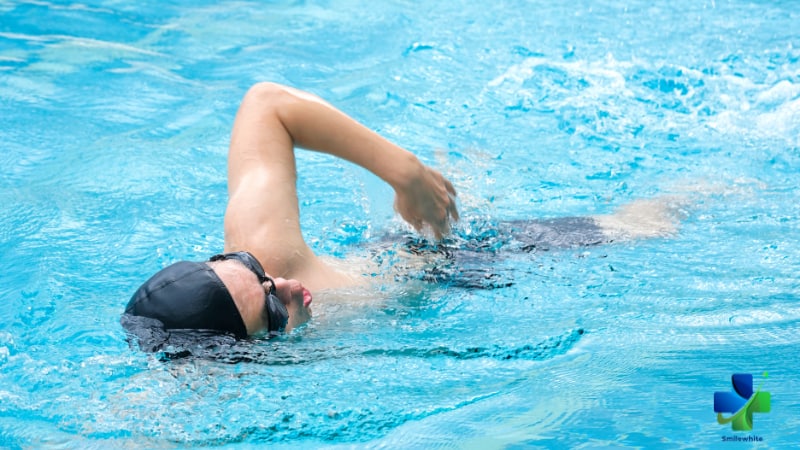Beauty Blog
Is Salt Water Good for Hair? Discover the Surprising Benefits
Beachy waves have a natural, effortless beauty, but understanding the impact of salt water on your hair is essential. In this blog, we delve into whether salt water is good for hair, examining its benefits and drawbacks.
By understanding how salt water affects your hair, you can make informed decisions to maintain its health and appearance.
Is Salt Water Good for Hair?
Salt water offers certain benefits for hair due to its rich mineral content, including magnesium and sodium. These minerals can help hydrate and rejuvenate hair shafts by depositing on the hair cuticle, refreshing dried-out locks.
However, it is important to limit your exposure to salt water, as prolonged exposure can lead to dehydration over time.
While beneficial in small doses, salt water can harm overall hair health due to its high sodium content. This can strip the hair of its natural oils, leaving it dry, damaged, and more susceptible to breakage compared to fresh water.
The dehydration effect of salt water is significantly more intense due to the higher concentration of salt. To combat these effects, rinse your hair thoroughly with clean water after spending time at the beach to help minimize possible damage.

How Salt Water Can Harm Your Hair?
Excessive exposure to salt water can significantly harm your hair’s health. High salt concentrations, like those in ocean water, actively extract moisture and essential oils from your strands.
This dehydration causes the hair cuticles to expand, leading to dryness and brittleness. Over time, this severe dryness can contribute to hair loss as your hair becomes more vulnerable to breakage.
Additionally, the rough texture of salt-impacted hair often leads to tangling, making it difficult to manage and style.
The impact of salt water is particularly harsh on dyed or chemically treated hair. These hair types are already compromised and more susceptible to damage.
Salt water not only intensifies this damage but also accelerates the fading of hair color, leading to more frequent dye applications, which further stress your hair.
Benefits of Salt Water for Your Hair
Salt water isn’t just for swimming; it also offers some surprising benefits for your hair. Rich in minerals like magnesium, sodium, and potassium, salt water can enhance the health and appearance of your hair in several ways:
- Exfoliation and Blood Flow Stimulation: Salt water can exfoliate the scalp and encourage blood flow. Stimulating blood flow helps more nutrients reach the hair follicles, boosting hair growth. A good scalp massage can also enhance this effect, as can a clinically proven natural hair serum.
- Anti-Fungal Properties: Salt water has anti-fungal properties that can help soothe flaky scalps and dandruff. However, it can also dry out the skin if used excessively, so moderation is key.
- Natural Shampoo: Salt water acts as a natural shampoo. If you have excess sebum and heavy oils on the scalp, the salt will strip away the natural oils, making your hair smoother. This is particularly helpful for those with greasy hair types.
- Volume and Body: Salt water crystals add volume and body to the hair by lifting the hair cuticle. This gives your hair a volumized look, making it easier to achieve the popular beachy waves. The crosslinks and keratin proteins in your hair determine each strand’s shape. Salt, sodium chloride, and magnesium sulfate create extra crosslinks in the hair, enhancing waves and curls.

How to Use Salt Water on Hair in 2 Cases
Salt water can be a natural and effective hair care treatment when used properly to maximize benefits and minimize possible damage. Here are two ways to use salt water on your hair:
Salt Hair Spray
Salt hair sprays are a convenient way to get that salty water effect on your hair. Here’s how to use it effectively:
- Spritz: Take the bottle and spritz it through your hair, focusing more on the roots for extra body.
- Adjust Quantity: You can spray as much or as little as you like, depending on the level of texture and volume you desire.
- Store-Bought or Homemade: You can find plenty of salt hair sprays in stores, many of which contain additional ingredients for extra protection and hydration. Alternatively, you can easily make your own at home by mixing water and salt in a spray bottle.
Swimming in the Sea
If you’re fortunate enough to live by the coast, swimming in the sea is a natural way to expose your hair to salt water:
- Go for a Swim: Simply take a dip in the ocean to let the salt water work its magic on your hair.
- Enjoy the Texture: After swimming, let your hair air dry to enjoy the natural texture and body it gains from the salt water. There’s a reason it’s called “beach waves.”

Tips for Protecting Your Hair When Exposed to Salt Water
When enjoying the beach or swimming in the ocean, protecting your hair from the harsh effects of salt water is crucial to maintain its health and beauty. Here are some effective tips for safeguarding your hair:
Choose a Protective Hairstyle
Wearing a protective hairstyle like braids or a bun can reduce the amount of salt water your hair is exposed to if you don’t have a swim cap.
While it won’t prevent all damage, it will lessen the impact.
Use Nourishing Hair Care Products
Your hair care routine plays a crucial role in your hair’s health and texture. If constantly exposed to salt water, adapt your routine to include plenty of nourishing and moisturizing products.
High-quality hair masks and oils like olive oil, argan oil, and coconut oil are relatively inexpensive and can significantly reduce damage from salt water.
Use a Hair Cap
A swim cap will prevent your hair from getting wet while swimming. For extra protection, apply a moisturizing product underneath the cap.
Apply a Barrier Product
Applying a barrier product like a hair mask or oil before entering the sea can help protect your hair from drying out.
Even rinsing your hair with fresh water beforehand can be helpful if you don’t have a barrier product on hand.
Rinse Hair Thoroughly with Clean Water
After swimming in the sea, it’s best to rinse your hair with fresh water to remove any salt. This prevents salt from forming crystals that can contribute to breakage.
Keeping an additional bottle of water with you at the beach for rinsing your hair can be very useful.

Can You Leave Salt Water in Your Hair Overnight?
Many stylists advise rinsing your hair with fresh water immediately after swimming. Nadia Dean, Senior Stylist at John Frieda salons, explains, “Leaving salt water on for too long can leave your hair parched and brittle.
Rinse it as soon as possible, even if it’s just with bottled water you have on the beach.”
Conclusion
The answer to the question “Is salt water good for hair?” is nuanced. While salt water can provide natural minerals that hydrate the hair, it also has a drying effect.
To mitigate potential damage, we recommend using protective hair oils, regular conditioning, and applying nourishing hair masks.
If you notice thinning hair or hair loss due to salt water exposure, exploring hair restoration methods such as hair transplants or hair growth products may be beneficial.
Please visit SmileWhite regularly to update other useful articles!
